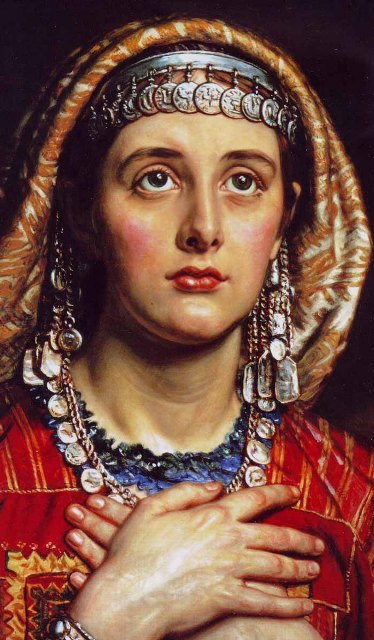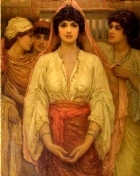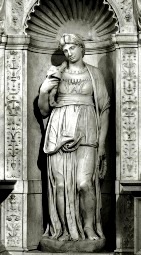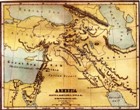Who was Leah, mother of sons?
Leah’s story has 3 parts:
- Leah is an unmarried girl, rather plain in appearance. She has a beautiful younger sister called Rachel. A handsome young stranger called Jacob meets Rachel & asks for her hand in marriage. Rachel’s father Laban agrees.
- Then he plays a cruel trick on Jacob: on the wedding night he substitutes plain Leah for lovely Rachel.
Who planned this cruel trick? Laban? Leah? - Eventually Jacob marries Rachel as well, but the rivalry between the two women continues. It comes to a head when they bargain over an aphrodisiac plant called a mandrake.
Main message of Leah’s story? Her dignity and status rest on what God does for her, not on her husband’s love or lack of it.
Jacob is smitten by Leah’s sister
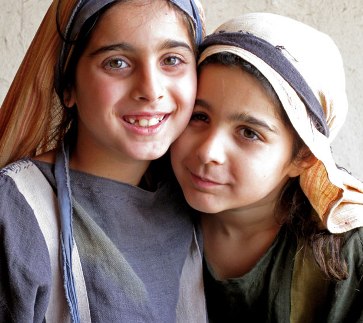 Jacob has deceived his father Isaac and brother Esau, and must now flee from the scene of his crime.
Jacob has deceived his father Isaac and brother Esau, and must now flee from the scene of his crime.
He heads east, towards the land of his kinsman Laban, seeking shelter there.
He meets some shepherds and asks them about Laban.
They do not seem enthusiastic when Jacob asks them ‘do you know Laban?’ Their words are guarded, brief. They know Laban well, and surely if he’d been a good man they would have said something in his favour.
But not a word do they say.
Jacob does not notice. He is distracted by the sight of an approaching girl. She is lovely, and he learns she is his kinswoman.
The Bible notes that she, not a brother or male cousin, is herding the sheep; this is unusual, and suggests she does not have any brothers.
Jacob is instantly smitten with Rachel. In a moment of male bravado he lifts the heavy stone well-cover, something that normally takes two or more men to do.
Meanwhile, where is Leah?
Rachel would have been allowed to roam around without the company of other women. In the painting below, the artist suggests that Leah was present at the meeting of Jacob and Rachel, but went unnoticed.
On the other hand, there is no mention of Laban’s wife, the mother of these girls. It is possible she is already dead, and Leah has assumed responsibility for running the household.
It would be a heavy burden for a young woman, since a household included not just the immediate family but relatives and servants as well. See The Ideal Woman for a list of the responsibilities a woman was expected to assume.
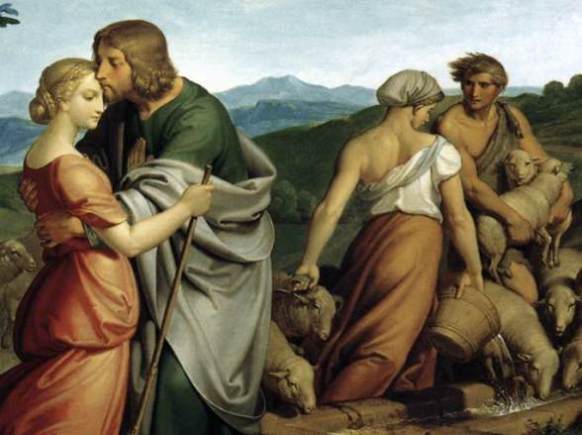
Detail from a painting by Joseph Fuhrich:
note the contrast between Rachel (left) and Leah (right)
Jacob is naturally eager to please Rachel’s father. He has no gifts or bride price too offer, so instead of a lump sum he agrees to work for seven years for Laban.
Under pretence of generosity, Laban imposes conditions that amount to servitude, even though Jacob is a relative. He reduces Jacob to the status of a hired labourer.
Seven years is a long time, but Jacob agrees to the bargain.
As far as we can tell, Leah watches all this in silence. The Bible tells us nothing about her emotions
- either towards Jacob (does she passionately love him at first sight, as he loves Rebecca?)
- or towards her younger sister Rachel (is she angry and jealous at the way her sister effortlessly inspires Jacob’s devotion)?
Laban will later point out that it is the custom in that part of the world for the elder sister to marry before the younger. Leah, who lacks the beauty of her younger sister, must have been humiliated by the way she has been overlooked.
Does this breed a deep resentment in her?
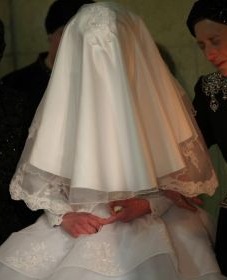
A fully veiled bride at a modern Middle Eastern wedding
Read the Bible text below.
A trick at the wedding
When the seven years have passed, preparations are made for the wedding of Jacob to (as he believes) Rachel. Laban is a man of some importance, so the wedding will be lavish.
One of the customs at a Middle Eastern wedding in this period (and in some places, even today) is that the bride remains completely hidden by heavy veils, both during the ceremony and after it, until her new husband removes these veils.
It is a symbolic gesture only, since the bride and groom in this case will certainly have seen each other many times. Despite this, the custom is strictly adhered to.
When Jacob marries Rachel, her face is hidden.
This allows Laban to play a cruel trick on Jacob.
When the bride is being prepared for her wedding, Laban substitutes Leah for Rachel. It is the unloved Leah under the heavy veil, and it is Leah that Jacob marries.
The wedding night passes without him realizing the substitution (odd?).
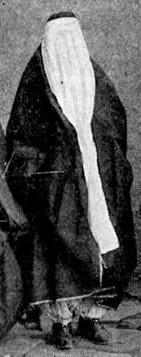
The conversation between Leah and Jacob the following morning, after he discovers she is not Rachel, can only be imagined. The Bible is discreetly silent on this point.
The Bible never mentions Leah’s wishes about marrying Jacob, a man who obviously preferred her sister….
Can you answer this?
There are questions that the Bible leaves unanswered:
- Was the trickery planned over a period of time, or was it a sudden decision just before the wedding?
- Whose idea was it to substitute one girl for the other? Leah’s? Laban’s?
- What were Laban’s motives? He is condemned for being greedy, but he also gets a husband for Leah who, because of her poor eyesight, might never have received an offer of marriage.
More questions
- Leah certainly knew what was going on, but was Rachel complicit also?
- Was she persuaded to go along with the trick?
- A later episode in her life shows she is even better at trickery than her father. Did she pity her sister and wish to help her?
- Or did Rachel have to be forcibly removed and hidden on the day of the wedding?
And more…
Who stands to gain?
Leah, who will acquire a husband who will forever distrust her?
- Laban, who will extract another seven years’ servitude from Jacob?
- Jacob, who will find out that Leah is competent, faithful and fertile?
Read the Bible text below.
Leah and the mandrakes
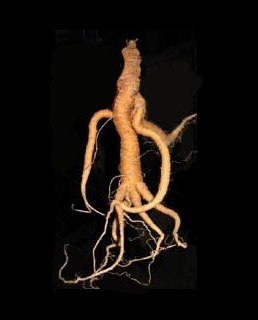
A mandrake root
The rivalry between the two sisters continues long after the wedding. In tribal society a woman’s status depended on the number of sons she produced (this was at a time when tribal warfare was endemic; the more fighting men in a tribe, the better and safer for the tribe).
Leah and Rachel both compete over who will bear the most sons to Jacob. Leah wins the contest. She may have been less loved than Rachel, but she nevertheless gave Jacob more children.
This gave her a higher status than Rachel, who had difficulty becoming pregnant.
This is borne out in the story of the mandrakes, a plant whose roots were used as an aphrodisiac and a cure for infertility in the ancient Middle East – possibly because the roots of the plant are shaped like human genitalia.
Jacob’s wives and children were well aware of the supposed power of mandrake roots, and on one occasion Leah’s son Reuben brings a mandrake plant to his mother, presumably for her use.
 Rachel sees the gift and begs Leah to give it to her. Some hard bargaining follows, and Rachel gets the mandrake root. It proves ineffectual.
Rachel sees the gift and begs Leah to give it to her. Some hard bargaining follows, and Rachel gets the mandrake root. It proves ineffectual.
Moreover Leah becomes pregnant again, with another and then another son. God is clearly on Leah’s side! ‘God hearkened to Leah’- the Bible stresses the true source of Leah’s blessing.
The upshot is that Leah eventually bears a total of six sons and a daughter for Jacob. He never loves her as much as he loves Rachel, but then her dignity and status rest on what God has done for her, not on her husband’s love or lack of it.
What do the names mean?
Leah means ‘cow’, a symbol of plenty
Jacob means ‘he who grabs’, either his brother’s heel at the moment of birth (see Rebecca) or his brother’s inheritance. It also means ‘deceiver’.
Rachel means ‘ewe’, a female sheep, symbol of prosperity
Laban means ‘white’, a colour linked with leprosy
The main themes in this story?
Look for true value. Leah is plain and unloved, but God sees her inner beauty and rewards her with many sons. Two of these sons are the forebears of the royal and priestly tribes in Israel.
Trust in God’s ultimate plan. Even if you don’t understand it at the time.
Read the Bible text below.
Paintings of Leah
Laban’s Daughters
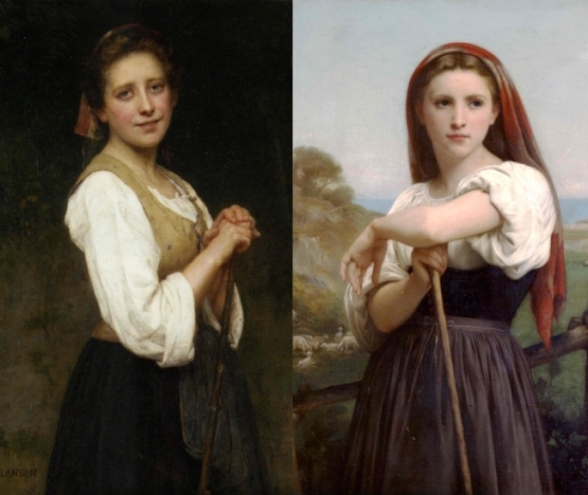
The Ancestors of Jesus, Jacob with Leah and Rachel, Michelangelo, Sistine Chapel (below)
The painting below is labelled ‘Jacob, Joseph’. On the left side sits Jacob – and the face given him by Michelangelo suits the deceitful man in Genesis well. Beside him is a rather sickly Rachel (she dies at the birth of her second son) with her first son Joseph. On the right side is Leah ‘of the beautiful eyes’, blessed with many sons and a daughter Dinah (far right), whose life will be ruined when she is raped by a man who professes to love her.
Be wary of information on art websites that tells you the ‘Joseph’ referred to in this painting is Joseph, husband of Mary of Nazareth, and that the female figure on the right is Mary of Nazareth. Comments like this are made by art historians who do not seem to have read the Old Testament stories on which Michelangelo based his Lunettes.
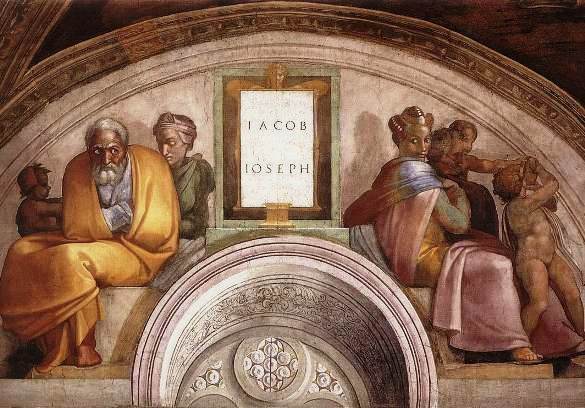
Leah and Rachel,
Dante Gabriel Rossetti,1855
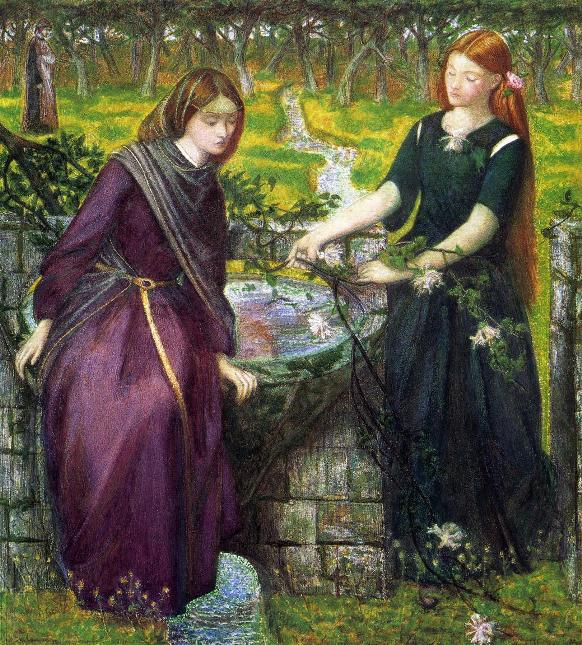
Leah, by Michelangelo
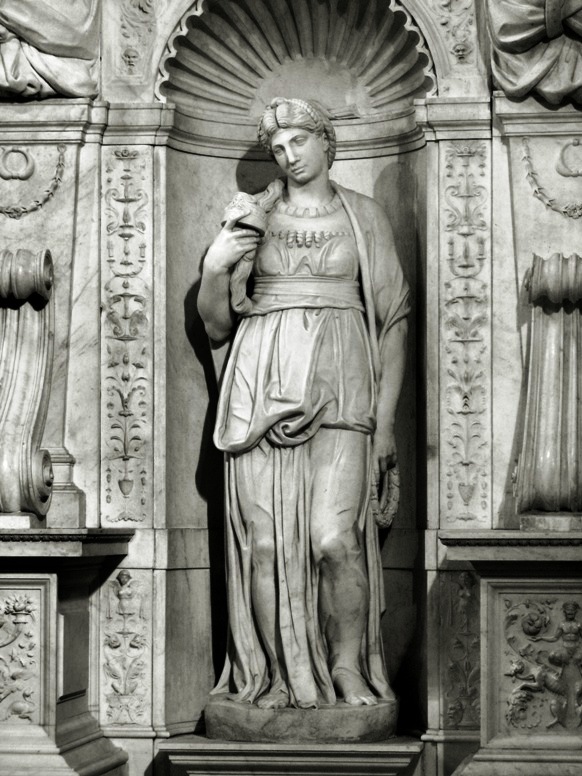
The Meeting of Rachel and Jacob
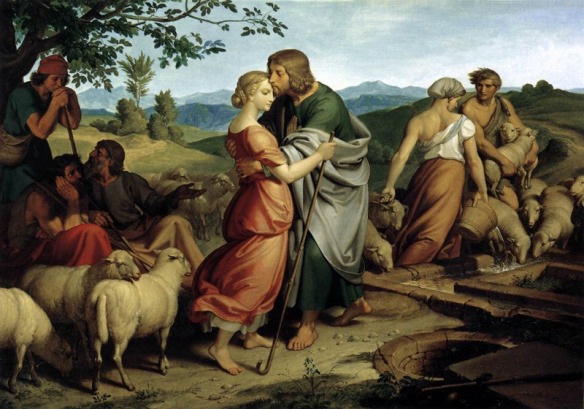
Notice Leah at right, keeping on task by pouring water for the sheep. Her figure is energetic, strong and practical, unlike the more demure Rachel. Notice also the intense look directed at her by the young man in front of her. Perhaps she already had an admirer. The Bible never mentions Leah’s wishes about marrying Jacob, a man who obviously preferred her sister.
Rachel lies to her father Laban about the missing terephim
Giovanni Battista Tiepolo, detail of mural
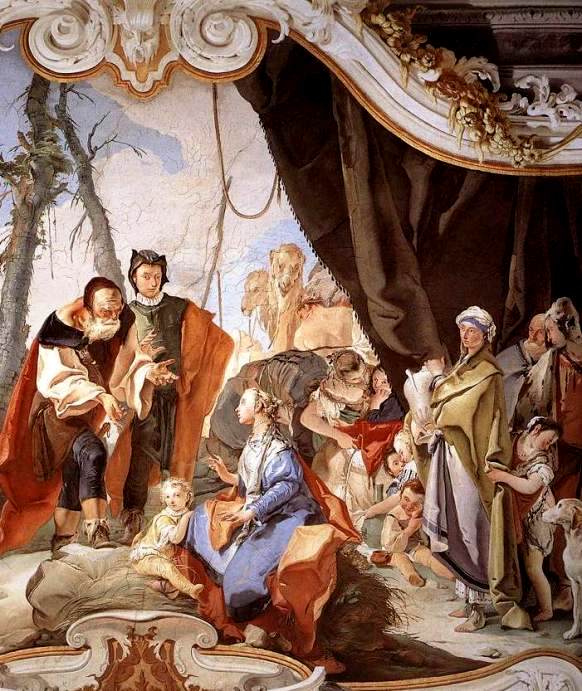
Leah, surrounded by her many children, stands behind Rachel. She holds a large urn, symbol of her fertility, but is ignored by the two men, who are focused as usual on beautiful Rachel, who is telling her father a lie.
Bible text
Genesis 29:1-20
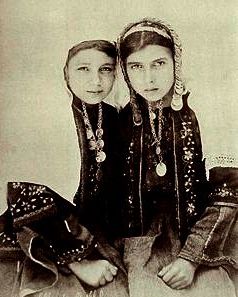
Two Middle Eastern sisters from Bethlehem, 1911
1 Then Jacob went on his journey, and came to the land of the people of the east. 2 As he looked, he saw a well in the field, and lo, three flocks of sheep lying beside it; for out of that well the flocks were watered. The stone on the well’s mouth was large, 3 and when all the flocks were gathered there, the shepherds would roll the stone from the mouth of the well, and water the sheep, and put the stone back in its place upon the mouth of the well.
4 Jacob said to them, “My brothers, where do you come from?” They said, “We are from Haran.” 5 He said to them, “Do you know Laban the son of Nahor?” They said, “We know him.” 6 He said to them, “Is it well with him?” They said, “It is well; and see, Rachel his daughter is coming with the sheep!” 7 He said, “Behold, it is still high day, it is not time for the animals to be gathered together; water the sheep, and go, pasture them.” 8 But they said, “We cannot until all the flocks are gathered together, and the stone is rolled from the mouth of the well; then we water the sheep.”
9 While he was still speaking with them, Rachel came with her father’s sheep; for she kept them.
10 Now when Jacob saw Rachel the daughter of Laban his mother’s brother, and the sheep of Laban his mother’s brother, Jacob went up and rolled the stone from the well’s mouth, and watered the flock of Laban his mother’s brother. 11 Then Jacob kissed Rachel, and wept aloud. 12 And Jacob told Rachel that he was her father’s kinsman, and that he was Rebekah’s son; and she ran and told her father.
13 When Laban heard the tidings of Jacob his sister’s son, he ran to meet him, and embraced him and kissed him, and brought him to his house. Jacob told Laban all these things, 14 and Laban said to him, “Surely you are my bone and my flesh!” And he stayed with him a month. 15 Then Laban said to Jacob, “Because you are my kinsman, should you therefore serve me for nothing? Tell me, what shall your wages be?”
16 Now Laban had two daughters; the name of the older was Leah, and the name of the younger was Rachel. 17 Leah’s eyes were weak, but Rachel was beautiful and lovely.
18 Jacob loved Rachel; and he said, “I will serve you seven years for your younger daughter Rachel.” 19 Laban said, “It is better that I give her to you than that I should give her to any other man; stay with me.”
20 So Jacob served seven years for Rachel, and they seemed to him but a few days because of the love he had for her.
Genesis 29:21-35
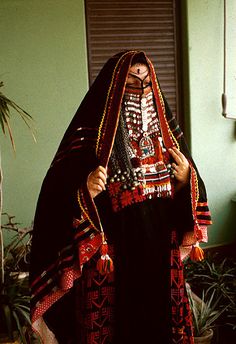
Heavily veiled woman
21 Then Jacob said to Laban, “Give me my wife that I may go in to her, for my time is completed.” 22 So Laban gathered together all the men of the place, and made a feast.
23 But in the evening he took his daughter Leah and brought her to Jacob; and he went in to her. 24 (Laban gave his maid Zilpah to his daughter Leah to be her maid.)
25 And in the morning, behold, it was Leah; and Jacob said to Laban, “What is this you have done to me? Did I not serve with you for Rachel? Why then have you deceived me?” 26 Laban said, “It is not so done in our country, to give the younger before the first-born. 27 Complete the week of this one, and we will give you the other also in return for serving me another seven years.”
28 Jacob did so, and completed her week; then Laban gave him his daughter Rachel to wife. 29 (Laban gave his maid Bilhah to his daughter Rachel to be her maid.)
30 So Jacob went in to Rachel also, and he loved Rachel more than Leah, and served Laban for another seven years.
31 When the LORD saw that Leah was hated, he opened her womb; but Rachel was barren.
32 And Leah conceived and bore a son, and she called his name Reuben; for she said, “Because the LORD has looked upon my affliction; surely now my husband will love me.” 33 She conceived again and bore a son, and said, “Because the LORD has heard that I am hated, he has given me this son also”; and she called his name Simeon. 34 Again she conceived and bore a son, and said, “Now this time my husband will be joined to me, because I have borne him three sons”; therefore his name was called Levi. 35 And she conceived again and bore a son, and said, “This time I will praise the LORD”; therefore she called his name Judah; then she ceased bearing.
Genesis 30:1-24
1 When Rachel saw that she bore Jacob no children, she envied her sister; and she said to Jacob, “Give me children, or I shall die!”
2 Jacob’s anger was kindled against Rachel, and he said, “Am I in the place of God, who has withheld from you the fruit of the womb?” 3 Then she said, “Here is my maid Bilhah; go in to her, that she may bear upon my knees, and even I may have children through her.” 4 So she gave him her maid Bilhah as a wife; and Jacob went in to her. 5 And Bilhah conceived and bore Jacob a son.
6 Then Rachel said, “God has judged me, and has also heard my voice and given me a son”; therefore she called his name Dan.
7 Rachel’s maid Bilhah conceived again and bore Jacob a second son. 8 Then Rachel said, “With mighty wrestlings I have wrestled with my sister, and have prevailed”; so she called his name Naph’tali.
9 When Leah saw that she had ceased bearing children, she took her  maid Zilpah and gave her to Jacob as a wife. 10 Then Leah’s maid Zilpah bore Jacob a son. 11 And Leah said, “Good fortune!” so she called his name Gad. 12 Leah’s maid Zilpah bore Jacob a second son. 13 And Leah said, “Happy am I! For the women will call me happy”; so she called his name Asher.
maid Zilpah and gave her to Jacob as a wife. 10 Then Leah’s maid Zilpah bore Jacob a son. 11 And Leah said, “Good fortune!” so she called his name Gad. 12 Leah’s maid Zilpah bore Jacob a second son. 13 And Leah said, “Happy am I! For the women will call me happy”; so she called his name Asher.
14 In the days of wheat harvest Reuben went and found mandrakes in the field, and brought them to his mother Leah. Then Rachel said to Leah, “Give me, I pray, some of your son’s mandrakes.” 15 But she said to her, “Is it a small matter that you have taken away my husband? Would you take away my son’s mandrakes also?” Rachel said, “Then he may lie with you tonight for your son’s mandrakes.”
16 When Jacob came from the field in the evening, Leah went out to meet him, and said, “You must come in to me; for I have hired you with my son’s mandrakes.” So he lay with her that night. 17 And God hearkened to Leah, and she conceived and bore Jacob a fifth son. 18 Leah said, “God has given me my hire because I gave my maid to my husband”; so she called his name Is’sachar.
19 And Leah conceived again, and she bore Jacob a sixth son. 20 Then Leah said, “God has endowed me with a good dowry; now my husband will honour me, because I have borne him six sons”; so she called his name Zeb’ulun.
21 Afterwards she bore a daughter, and called her name Dinah.
22 Then God remembered Rachel, and God hearkened to her and opened her womb. 23 She conceived and bore a son, and said, “God has taken away my reproach”; 24 and she called his name Joseph, saying, “May the LORD add to me another son!”
Read about more fascinating women of the Old and New Testaments
Search Box
![]()
Bible Study Resource for Women in the Bible
Leah, married to Jacob and mother of many children, envied by Rachel
© Copyright 2006
Elizabeth Fletcher

